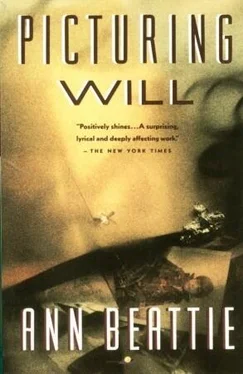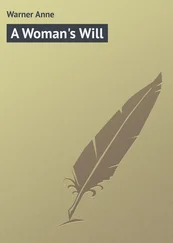Bedtime was always a difficult time. Sometimes she was convinced that Will did not love her at all and that if he were reincarnated as a cowboy he would drop a lasso around her neck. If he became a doctor, his bedside manner would consist of walking away from her bed. As a dragon, he would breathe fire into her face. His desire to escape was transparent, yet she was also sure that he would marry her if she were not his mother. As it was, he pushed her away when he could stand to, hurt her when he couldn’t stop himself, and nestled against her at night when he was too tired to be anything but her baby. Sometimes he crept into the bedroom early in the morning, on the run from having been imprisoned in some dream. Other times he put his toy stethoscope around his neck and listened to the heartbeat of the table leg, the porcelain vase, the amaryllis stalk — those mysterious, silent rumblings that went on in the adult world all the time. He watched TV and imitated the stance of cowboys about to rope a steer, although what Jody noticed were the scars on his knees. He had fallen on the blacktop at school so many times. You would think that a gathering tornado drove him to race for the distance, at a speed no one could sustain.
She felt a strong bond with Will, but it was Mel who adored him sensibly , Mel who was flexible enough to use common sense instead of preconceived ideas, Mel who could silence Will by looking pained by what he was doing quicker than she could stop him by grabbing his hand and pulling him. Mel was gracious — it was one of his best qualities; he was genuinely gracious. He said that because Will was not his child, he found it easier to go to the heart of the issue.
“I’m going to check on them,” Mel said as he passed by Jody, who was rearranging jackets in the hall closet. A mummylike stillness in the room upstairs had made him suspicious. (He had come in to see if Jody had been swallowed by the silence; he should have known that she was brooding — brooding and preparing herself for an argument if he didn’t back down and stop pressuring her to move.)
Mel walked close to Will’s perfectly straight body, put his nose lightly on the tip of Will’s nose and Will rose up, squealing. Wag also gave up his pretense of being asleep.
“We were playing mole,” Will said. One of their favorite games was mole. They burrowed deep into the covers Jody piled on the bed — she had a horror of awakening cold with not enough blankets — and twitched their noses, following the scent of buried treasure, or quickly flapping back a corner of the covers and letting the wind tell them the best route to escape from their enemies.
“Finish playing mole and go to sleep before we get back, or we’ll both be in trouble,” Mel whispered.
Coming downstairs, he took his scarf off the banister, where he had draped it when he arrived. It was going to be too cold for late-night walks soon. The rustling of leaves would end. The mountains would be easier to see, fading from gold to bluish gray.
Jody got off the porch swing when he came out of the house. She had been worrying that if they married she would take him for granted. Not that he would take her for granted, but that she would take him for granted. He wanted to have a child with her, and she did not want more children. This meant that she would let him down and be disappointed in herself, while he would no doubt survive with his feelings intact. He always encouraged her. If she succeeded as a photographer, she feared, she might not need his encouragement in the same way. She needed to need him. Need enforced manners on people. It was only children, who made no distinction between what they needed and what they wanted, who were confused enough, or honest enough, to give in to thrashing in the presence of whoever foiled them.
He put his arm around Jody’s shoulder. She had a sudden thought, turned, and locked the door. He saw her questioning look and folded his hands as if in prayer. She hadn’t been in the house when Will spoke, so she didn’t know the boys were awake. He put his cheek on his hands and closed his eyes, letting her assume, from the gesture, that Will and Wag were sleeping the sleep of angels. He felt a twinge about deliberately misleading her, but finally it seemed a minor matter: sniffing moles or slumbering angels. They were safe in bed.
He thought about telling her that he had made inquiries about the possibility of Will’s attending Collegiate. That he thought they should move to a larger apartment in New York — farther downtown, where you could see the sky. That she could have a darkroom in the same building where he worked, in SoHo.
Her head was resting on his shoulder. They had taken this walk so many times. He had resolved, so many times, that he would succeed in persuading her to marry him. Silently, he began to rehearse his opening line, so that he was surprised himself when only a tired “I love you” came out, and then nothing more.
King Kong was a mystery, but Jody suspected the frog was Bob Walsh, because it was quite tall and had Walsh’s way of walking. Many people had taken off their masks or headpieces, but King Kong had revealed nothing of himself. She had taken a photograph of him holding his hairy costume away from his chest and shaking it to allow some air to circulate inside.
Jody was photographing a Halloween party at an abandoned church twenty miles outside of town. She had been hired by one of the men who owned the hundred acres and planned on tearing down the old clapboard church. Earlier in the year she had photographed the same man’s daughter’s wedding, which took place in an orchard adjacent to his Earlysville property. He had made it clear that if she hadn’t been involved with someone, he would have liked to have an affair. Will had been along that day, dressed in a gray suit that resembled Mel’s favorite suit, because at the last minute the baby-sitter had canceled, and she couldn’t get Duncan or Mary Vickers on the phone. She had promised Will a Lego train if his behavior was impeccable, and as the father of the bride tried to ingratiate himself with Jody, Will kept coming to her side — and her rescue — with visions of train tracks and imaginary puffs of smoke rising in his eyes. Lowering his voice, as if his whispered tones would escape Will’s notice, the father of the bride suggested having a drink, in order to offer her some advice about real estate investments in the county. She was curt with him because she wasn’t interested, but also amazed that he thought she had that kind of money. The following day, three dozen irises had arrived, and that afternoon Will’s new train whizzed through Iris-land: water glasses filled with flowers meant to approximate trees the train would pass by.
At the wedding, she had moved away quickly once the man’s intentions were clear, walking across the grass, holding Will’s hand. She wondered how many times women tempted Mel in New York. Mary Vickers’s expression about Jody’s refusal to make a permanent commitment to Mel was that she was “playing with fire.” Hardly a unique way to express the idea of danger, but over time Jody had come to interpret what Mary Vickers meant by “fire” as having to do with all the matches carefully cupped in waiters’ hands as they ignited the white candles on your dinner table; all the flame-haired beauties who had back-combed and sprayed their hair to make it wild and electric; all the hot tips you got every day, about as-yet-unannounced corporate mergers, about which doorman would tell you honestly how many tenants might be about to die. Mary insisted upon seeing New York as either burning or smoldering, whether it involved physical passion, or the burnt-rubber smell that rose off the streets from so many slammed brakes, or lunatics who wired themselves and blew apart on the subway. Of course Mary Vickers feared and hated New York so much because she had convinced herself that it was the city — anthropomorphized as a burning witch — that had taken her lover away from her. She was sure that if Jody didn’t watch out, time and the city could well do the same with Mel.
Читать дальше












